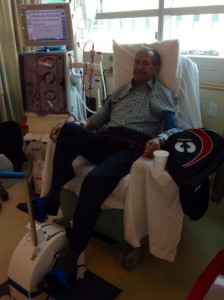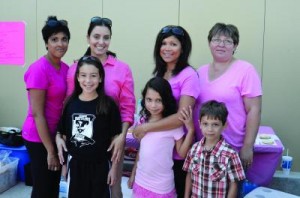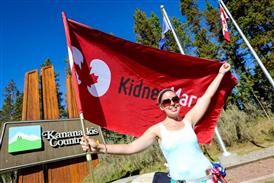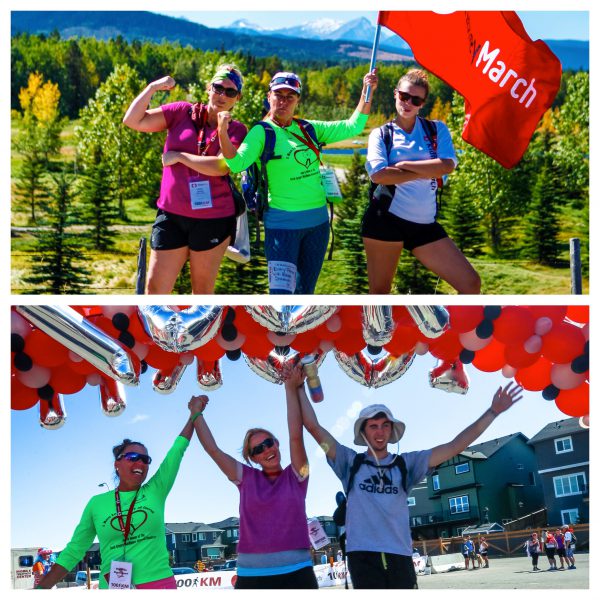
Tag Archives: Why We March
Kidney Marcher Manjinder Mann walks 100 K’s in the UK!
Posted by Admin /
You may already be aware that 2015 Kidney Marcher Manny did this year’s Kidney Marchin Manchester, UK this past weekend while the 2016 Marchers and Crew made their way from K-Country to Calgary. Manny completed his SOLO 100 kilometres in TWO DAYS – 60 kilometres on Saturday, and 40 kilometres on Sunday. He was marching for his two-and-a-half year old son Harbin.
Check out his interview with Angela Knight on CBC Radio’s Calgary morning show the Eyeopener. Click play below.
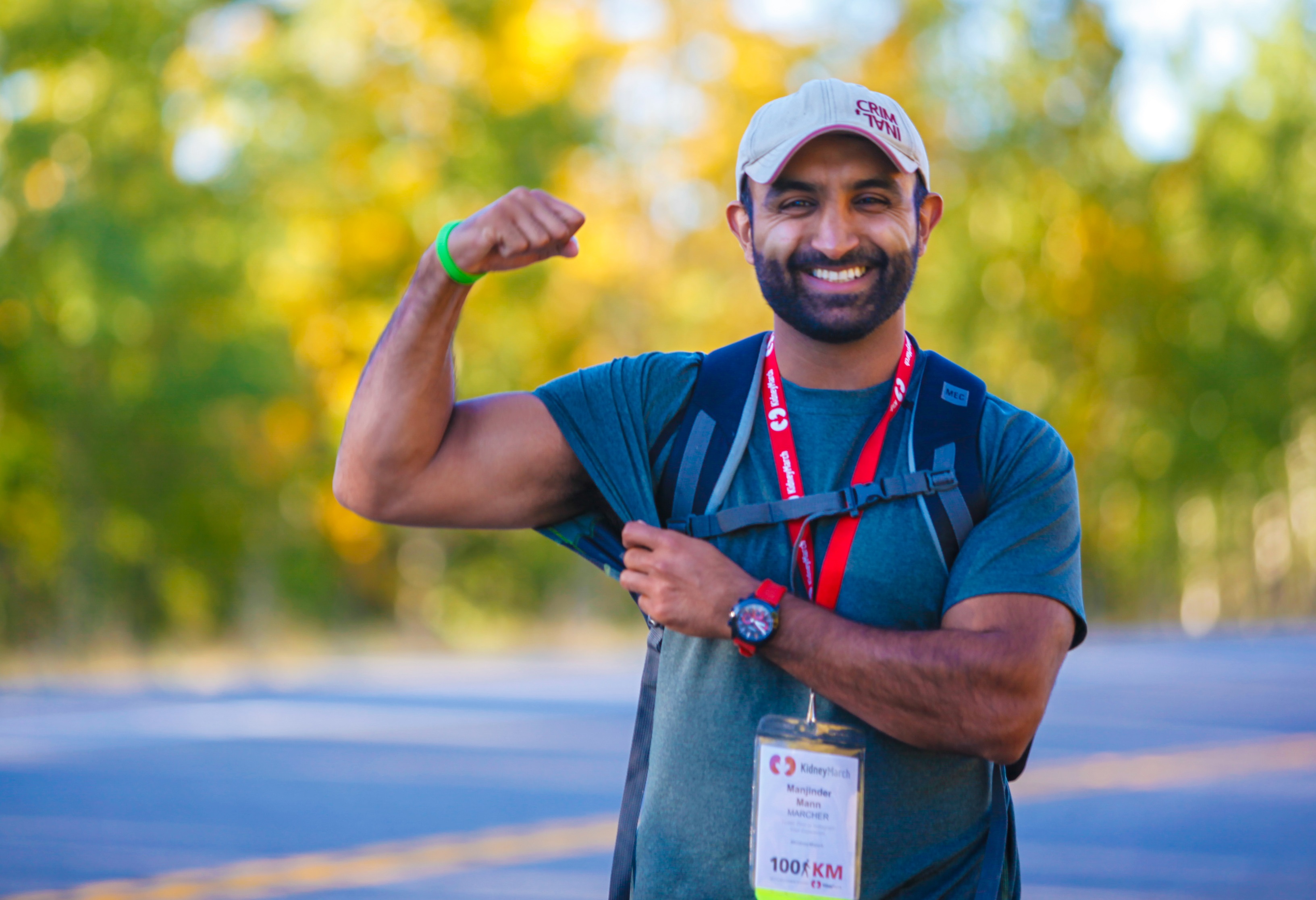
Sean’s mom is marching, in hopes no other family has to endure the pain and fear of kidney disease
Posted by Admin /
Shannon, a first time Marcher, thought her son was having an allergic reaction and took him to Alberta Children’s Hospital for treatment. After being seen, they were escorted into a consultation room and told Sean has a kidney disease called childhood nephrotic syndrome. He was just 3 years old. Shannon’s initial response was “No, my son is here for an allergic reaction, not kidney disease. You must have the wrong child.” Unfortunately, the fight against kidney disease is much harder than that, and for the next two years Sean battled heroically with daily urine dips and extremely high doses of prednisone. The required amount of prednisone caused Sean to become steroid dependent. Whenever doctors tried to take him off the drug his kidneys would respond by spilling protein into his urine. Without protein going into his bloodstream, as it should, his blood lacks enough oxygen needed by his cells and tissues to support their functions. That meant Shannon’s darling little boy had to undergo chemotherapy with weekly blood tests.
Now two years later, Sean is 7 and in remission. That sounds like cause for cheer, but, in truth, it is cause for worry. Sean’s doctor says his progress is brilliant however for true remission they look at a period of five years without relapse. Fear of relapse hangs heavy. In preparation for this possibility, Shannon has empowered Sean with age appropriate information about his care. Meaning this second grader is well aware that sodium and potassium are hard on his kidneys and, while tough, he picks food that is good for his body. In addition to protecting his kidneys, a good diet and lifestyle are vital for Sean because, as Shannon shares, “a cold or flu, which is usually an inconvenience for most kids and families, could send Sean back to ground zero, back to prednisone and chemotherapy.”
Shannon is doing everything she can to care for Sean, ensure he grows up with the healthiest kidneys possible, and prevent other families knowing the pain and fear of kidney disease. That is why Shannon is marching in Kidney March.

Meet Brynn! Our amazing summer student, who also knows the hardships of kidney disease
Posted by Admin /
 It’s Day Zero! We wanted to introduce you to a new face on the 2015 Kidney March Team you’ll be seeing this weekend, Brynn. She is our AMAZING 2015 summer student who has been working hard all summer for the best weekend of the year, Kidney March. Brynn shares with us why working as part of Kidney March is so important to her and her connection to kidney disease.
It’s Day Zero! We wanted to introduce you to a new face on the 2015 Kidney March Team you’ll be seeing this weekend, Brynn. She is our AMAZING 2015 summer student who has been working hard all summer for the best weekend of the year, Kidney March. Brynn shares with us why working as part of Kidney March is so important to her and her connection to kidney disease.
For 22 years my Grandfather was on at-home dialysis while my Grandmother lovingly took care of him. Twelve or so years ago my Uncle had a kidney donated to him by a coworker. Three years ago this past June marks the date of my Father’s successful transplant. And six years ago, I too was diagnosed with Polycystic Kidney Disease.
The way this disease seems to affect my family, focuses on onset at a later age. For example, my kidneys look like the surface of a Sunday afternoon bubble bath under an ultrasound with all the cysts covering them, however their function is currently, miraculously fine. The same goes for my Father who was diagnosed at 21 years of age, and who didn’t really have to worry about watching the number of bananas he’d put in his smoothies until his mid to late forties.
Four years ago we really started to notice when things got worse and his kidneys started to fail. One month he would be working 12 hour days and going for long bike rides or jogs with me on the weekend, and the next he could only manage two hours of work before he had to leave his shop and come up for a nap. His kidneys were nearing less than 6% function and the amount of toxins in his blood made it extremely difficult for him to find the energy to do many things he would have previously done with ease. It was hard to see my vibrant, fun-loving, and gentle father slowly wither away. Even the classic ‘dad jokes’ were far and few between.
Eventually, while waiting for news of a transplant, he began dialysis. It wasn’t more than three times a week for four hours each time, but it was a schedule that was new to our family life, and something we all had to get used to. Despite the incredible support shown through a number of friends and family members who had stepped forward over the months to be tested as potential donors, including The Kidney March’s very own Marianne Janz (otherwise known as my wonderful Aunt), a direct match had yet to be found.
Six weeks after he began dialysis, my mother, who had initially been the first in line to get tested, decided to enter the paired exchange in hopes that it would give my dad a better chance at a kidney. With the paired exchange, two people enter in as partners, but do not have to be a match. One partner is a donor, and the other a receiver, paired together with other partners to create a large chain of transplants that fit people together like puzzle pieces. It is amazing technology, though can be incredibly unreliable if one person, for any reason, backs out at the last minute and breaks down the whole chain. After one potential chain ended up falling apart, another was built, and on June 20th 2012, both my parents went into surgery while my brothers and I waited nervously.
To say that the surgery was a success is an understatement. I was the first to visit him in the recovery room afterwards and once I saw that (still drugged up) grin coming out from under his beard, I knew my dad was back. To this day he still constantly jokes with my brothers that now that he has three kidneys, no one can ‘take him.’ Though turns it around just as quickly if he’s losing the wrestling match in an effort to ‘please save his one good kidney.’ The fun never stops.
Seeing the incredible support that my family and especially my parents have had for each other has not made me nervous about my future in the least. Research is expanding, technology is growing, and my older brother is a match with two healthy toxin-filters that he has already promised me one of for when the time comes. (Thanks Ben).
On top of this, I’ve had the pleasure of working as a part of The Kidney March family for what has been a most incredible summer. Through this opportunity I have met and am still meeting many amazingly inspirational people with stories of their own, each as unique and differentiated as the disease we walk for. Never have I ever had such a close, personal connection to the work I’ve done, nor felt so much like I was actually helping in making a difference. Thank you to The Kidney Foundation for all you’ve done for my family, thank you to The Kidney March for being my home away from home, and thank you to the people who are all walking together for one reason or another; we’re doing it together, in the same direction. ~Brynn
As a young man with a young family, Trevor Ferguson was shocked when doctors told him he had polycystic kidney disease. In his own words, he shares his story.
I was in the hospital for testing for another ailment and, while delighted that testing came back ok, I didn’t have a clue what life with kidney disease would be like. Immediately, I was referred to a nephrologist. Together we made a plan to get me to transplant without going on dialysis first. That was 12 years ago.
Throughout that decade of living with kidney disease there were definitely some challenges. My wife, Sam, was my rock. Her support was definitely the reason I could keep on going, keep on working, and keep up with my family. As my cysts grew, and my kidney function declined, Sam came forward for testing as a living donor for me. She was well into the testing when my sister Holly said… err no, and insisted that Sam back down and allow her to go forward. Holly realized that Sam would need to be full strength to help me recover from transplant surgery and take care of our two sons. We feel really lucky for that foresight.
Susan, mother of 3, marches for her daughters’ future
Posted by Admin /
In September 2011, one year after undergoing my life-saving kidney transplant, I wrote the passages below about what motivated me to walk in Kidney March with my kidney donor (and sister-in-law) Marian Reich.
I am marching in the Kidney Walk to Calgary because
I believe research is hope. I believe in the power of research and in supporting a cause that makes a real difference in peoples lives.
Over the last 30 years, the Kidney Foundation of Canada has raised over $100M for research. That’s a huge number. Even more amazing is that it has been raised in communities across Canada by individuals like you and me — the families and friends of those affected by kidney disease. These passionate, determined people have held event after event, knocked on door after door,… year after year,… because they believed things could be better. They hoped that an investment in research would change things.
And it has. Research has led to improved quality of life, better dialysis methods, earlier detection and prevention, and for a lucky few, (13% of those diagnosed) a new lease on life through transplantation. If you don’t believe me, talk to your friendly neighbourhood nephrologist, he or she will tell you, as they have told me, what a difference the Kidney Foundation has made to advancing kidney research.
I am marching because
In 1977, Neil Everett McKenzie died in Toronto undergoing his 2nd failed kidney transplant. He was 55. He had been on peritoneal dialysis for what seemed to me to be a very long time. He wore a feather in his hat and always smelled clean. He took us for long drives through blue mountain and somehow made us feel like we were on a roller coaster. He teased and spoiled us horribly. He was a World War II Veteran and a determined man. He never gave up hope.
I am marching because
In 2006, Blaine Everett McKenzie died in Collingwood after a relatively short but painful battle with cancer of the kidney, liver and pancreas. He was 65. He was diagnosed with kidney disease in 1972 and received a transplant in 1975 which kept him alive for 31 more years — allowing him to finish raising three young children who loved him more than life itself. Probably because of his training as a marine engineer, his hand writing was unusually precise and beautiful. His laugh was deep and sincere, like his faith, our countless philosophical discussions over tea, and the love he had for his family and friends. Like his determined scottish father, he never gave up hope, not even in the very last days.
I am marching because
In 2010, I was given the gift of a new life through living donor transplantation. There are no words to thank the many people who supported and strengthened me through this part of my life’s journey. There are no words to thank the person who risked her life so I could have another chance at mine, no words to thank the individuals, my friends, who went through exhaustive testing, preparing themselves to take a huge risk to help me. I won’t waste this chance. It is time to act. This walk, like many other things we may choose to do in our lives to make a difference, is a tangible act of determination and an act of hope. Like my stubborn grandfather and father, I will never give up hope. I guess it is in the genes. You have take the good with the bad 🙂
I am marching because
I have three beautiful daughters who depend on this life changing research continuing. Like the hundreds of thousands who may be profoundly affected by kidney disease in the next decade, directly or indirectly, research is their hope too.
Now fast forward to today. If my past and present wasn’t enough, this year, I have even more reason to be involved once again.
In September 2014, Alexandra Hope Smith was diagnosed with kidney disease. Despite a family history of the disease, it was still a shocking diagnosis for a healthy young woman with no symptoms and her whole life in front of her. Though she was rarely ever ill or even unhappy for that matter, I have a vivid picture in my mind of the wee tot who looked a lot like tweety bird squeezing her big blue eyes in utter fear whenever we rumbled over the unpaved part of the road that led to our home in the country. I remember how bad I felt when I saw that terrified look on her little face, so I drove faster to get off the road and take the fear away.
And now, twenty years later, I have that same raw feeling of helplessness as I struggle to figure out how I can help take away her fear as she navigates this scary but all too familiar path. This time, I can’t drive faster or reach into the back seat to hold her hand and make things better. This time, I can’t drive off the gravel road. All I can do is face this family kidney curse again — head on — this time with my kind and beautiful daughter. Of course, we’ll do what we have to do and there will be a few tears, but we won’t stop to dwell on it or allow it to derail any of Alex’s hopes and dreams. We will shore ourselves up, ask lots of questions, and we will find the answers together. Love you Allie Cat.
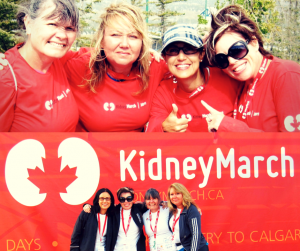
Kidney March Patient Program – Pedal Power
Posted by Admin /
Throughout dialysis units across southern Alberta, dialysis patients are participating in their own Kidney March. Challenged to complete 100 kilometres of activity, patients pedal on specialized bikes that are pushed up to the dialysis chair. So far Jake, pictured above, has cycled 500 kms en route to his goal of 800 kms by September 7th. Being active while dialyzing is shown to clear more toxins from the blood and we applaud Jake and all our participants! In addition to getting several other benefits derived from leading a more active lifestyle, these participants are also raising funds for The Kidney Foundation of Canada. Jake is in the top five of our individual fundraisers for Kidney March.
You may have the opportunity to meet some of the Patient Program participants during the closing ceremonies. These individuals are not walking beside you in Kidney March but they are with us every step of the way.
Team Christina’s fundraising was feautured in the Medicine Hat News!
Posted by Admin /
Source: Medicine Hat News – published July 22 2013, by Charles Lefebvre.
Voula Douvis has a strong motivation to take part in the 2013 Kidney March this September.
“A year ago, my daughter Christina was diagnosed with kidney disease,” she said. “Our lives have changed quite a bit.”
Christina, who is 10-years-old is now on a number of medications which affect her in different ways, and the family has to make a number of trips to the children’s hospital for regular blood tests.
The diagnosis inspired Voula to form a team with Dawn Hunt, Sonita Goehring and Lisa Perich to participate in the Kidney March from September 6-8 in Kananaskis. Douvis was out on Saturday with her team in front of Wal-Mart, holding a fundraising barbecue to raise money for the foundation leading up to the march.
Kidney Marcher shares her story in the Shawnessy Newsletter!
Posted by Admin /
Source: Shawnee Evergreen – Published July, 2013 by Erin Birbeck.
Most people diagnosed with kidney disease the news comes as a surprise. They had little awareness of kidney disease until forced with the diagnosis. For local Shawnessy resident Shannon Guyett, this is not the case. Several generations of Shannon’s family have been affected by kidney disease, and she knows all too well the burden it creates. Watching both her grandfather and father die from kidney disease, and then being diagnosed with polycystic kidney disease (PKD) herself, Shannon was determined to change the fate of her family. Unfortunately, the fight against kidney disease for Shannon’s family did not stop with her. At age 13 her daughter Alyssa was diagnosed with the same disease that has drastically altered Shannon’s life. Seeking to help her daughter adapt to a life with kidney disease, Shannon came to The Kidney Foundation of Canada.
When Shannon heard about the foundation’s annual Kidney March, there was nothing stopping her from taking on the challenge of walking 100 kilometers, in 3 days, from K- Country to Calgary.
Shannon explains, “When you go from having full kidney function and living life to the fullest, to finding out your kidneys are only functioning at 28%, it’s an eye opener. I can delay kidney failure but will not be able to stop it.”
Kidney Marcher’s fundraising is featured in the Lethbridge Herald!
Posted by Admin /
Source: Lethbridge Herald – Published June 29, 2013 by Simmons, Garrett.
At the age of 25, living a healthy life, the last thing Kate expected was to be diagnosed with chronic kidney disease. However, when the former Lethbridge resident experienced severe headaches that would not go away, she was shocked to learn her kidneys function had dropped to an astounding 13%. Kidney disease usually starts silently and slowly, which is why it is often referred to as the silent killer. Most patients are treated on dialysis when their kidney function reaches 15%.
Two years later, thanks to dramatic lifestyle changes and medication, Kate’s kidneys are functioning at above 20%. Kate is grateful that on some days, she almost forgets that she has kidney disease. She is dedicated to living life to the fullest, knowing that sometime in the future the investable will happen, and she will need a kidney transplant.

